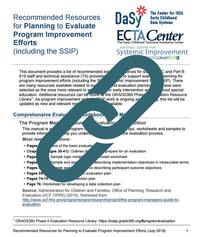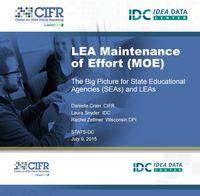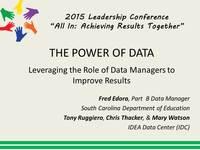Site Search
Results 22 - 28 of 608
Format: Reference Materials
Recommended Resources for Planning to Evaluate Program Improvement Efforts (including the SSIP)This document provides a list of recommended existing resources for state Part C and Part B 619 staff and TA providers to use to support evaluation planning for program improvement efforts including the SSIP. The document focuses on resources that are more relevant to evaluation and evaluation planning for early intervention and preschool special education.
Format: Presentations
IDEA and FERPA - Understanding the BasicsThis presentation informed participants of the privacy provisions under IDEA Part C, IDEA Part B, and FERPA. It covered the basics surrounding the legal requirements related to the protection of PII about children with disabilities and where to go for help with questions about privacy. The audience for the presentation included administrators and practitioners who are concerned with providing services for children and youth while maintaining the privacy of the children and youth they are serving.
Format: Presentations
LEA Maintenance of Effort (MOE)—The Big Picture for State Educational Agencies (SEAs) and LEAsThe IDEA requires LEAs to annually maintain their local or state and local expenditures for the education of children with disabilities. SEAs are required to ensure that LEAs are in compliance with MOE. The CIFR and the IDC presented the basics of LEA MOE options to meet the MOE requirement, the allowed exceptions to reduce MOE, consequences of MOE noncompliance, and fiscal and program requirements necessary to determine the LEA MOE eligibility and compliance. A representative of the Wisconsin Department of Public Instruction shared the state's success story and processes.
Format: Presentations
The Role of IDEA Data Managers in LA/SEA Data Governance ProgramsData governance is a critical function for organizing and exerting proper influence over data management decisions. During the last several years, many LAs and SEAs have defined and adopted data governance programs. This session explored the role of IDEA data managers as data stewards in SEA data governance programs.
Format: Presentations
Now You See It: Seeing the Story in the DataThis session demonstrated creative ways data are being displayed to tell the story of IDEA and other data. Participants heard from states that are displaying data in ways that tell data stories and convey meaning to stakeholders and the public. Participants also saw ways to access various online federal education data. This session offered participants online resources and websites about effective data displays.
Format: Presentations
Identified Significant Disproportionality – Now What?After a State determines that a district has significant disproportionality, what are the next steps? Presenters and session participants discussed how states can identify technical assistance and available tools and resources to help LEAs identify root causes and implement action steps, including CEIS, to make substantive improvement.
Format: Presentations
The Power of Data: Leveraging the Role of Data Managers to improve ResultsThis session examined the strategic role data play in state agency decision making by exploring how data managers can more effectively use their role to promote public reporting, data awareness, data utilization, and systems change. Presenters paid particular attention to data governance, cross-department information sharing, timely data access, distribution, usability, and analysis, along with examples of best practice from practitioners in the field to ultimately improve student results.







